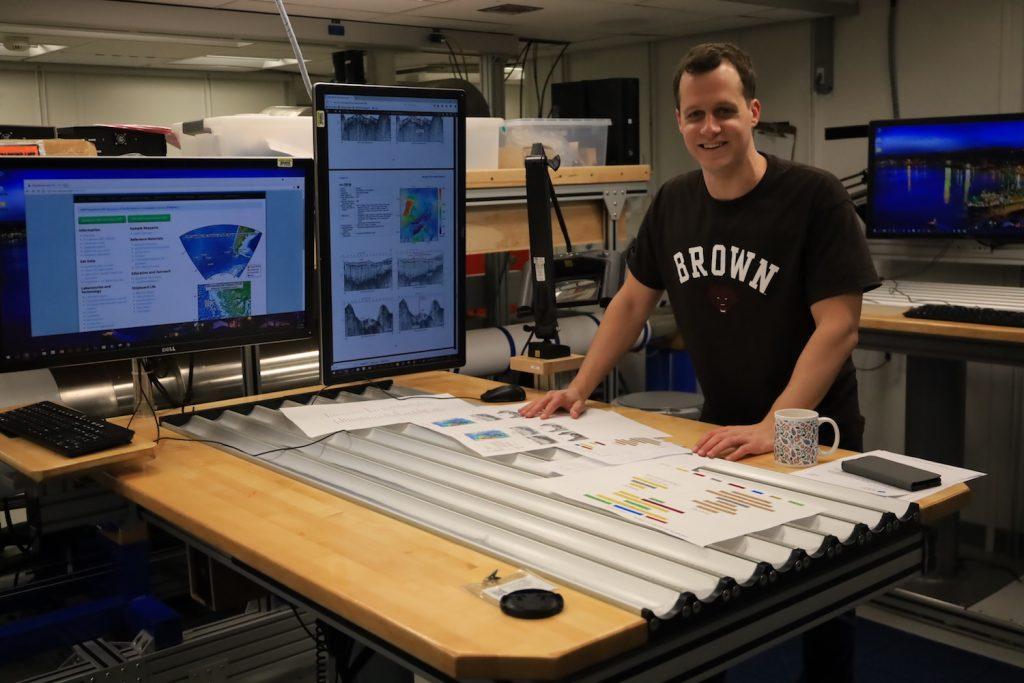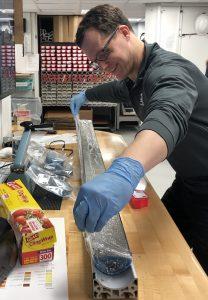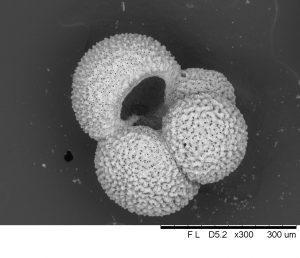
Career Spotlight: Sedimentologist Jesse Farmer

Jesse Farmer Interview
Please describe your job duties while on the JR. What will you be doing on a daily basis?
-
-
-
-
-
-
-
-
- I will be describing the features (sediment color, texture, content) and collecting logging data (color, x-radiographs, and magnetic susceptibility) on every centimeter of sediment that we recover!
-
-
-
-
-
-
-
Describe one instrument or tool that is essential for you to do your job? Or a piece of equipment on the JR that is useful and why – what does it do?
-
-
-
-
-
-
-
-
- The SHIL- section half image logger. This takes pixel-by-pixel images of every sediment core. In geology, you can’t always trust what you see. But these images will form the foundation for our further investigations of what sediments we recovered, and how they tell us about past climate.
-
-
-
-
-
-
-
Why is your work (or research) important? What question are you trying to answer or how does your work/research help assist/advance scientific knowledge?
-
-
-
-
-
-
-
-
- On the JR, my work allows the current scientific team and future scientists to understand exactly what was collected and best target materials to answer their own scientific questions.
-
-
-
-
-
-
-
- More broadly, my research seeks to understand how Earth’s oceans impact the concentrations of greenhouse gases (particularly carbon dioxide) in the atmosphere, and how changes to the oceans impact climate (and vice-versa). Currently the oceans take up about a third of all the carbon dioxide we emit as a society. Understanding what affects this uptake and how it might change in the future is essential for accurate forecasts of future climate change.

Why the ocean? What made you choose a career at sea or career that involves the ocean?
- I was fortunate to grow up on the barrier islands of eastern North Carolina, surrounded by the sea. Seeing its various moods on a daily basis and witnessing its awesome power in hurricanes firsthand motivated me to wonder how the ocean worked.
What are you most excited about for this expedition and/or being on the JR?
- I can’t narrow down to one so I’ll give two. 1) Seeing the ‘sausage made’. Sediment cores from the JR underlie my entire field of study. Getting to see how they are collected, described, archived, and sampled, and contributing to that, is a privilege. 2) The transformative potential of science from this expedition. I’m sure most scientists say that about their particular expedition, but I think it is more true here than anywhere. I am very confident that the work we do here will shape the field of climate science in the upcoming decades
What are three things you think are needed for a successful expedition at sea? And Why!
- Patience, communication, and a sense of humor. These traits are assets for everyday life, and going to sea is just a cooler version of everyday life.
If you could answer one question about our Earth – what would it be and why?
- Did levels of carbon dioxide (CO2) in Earth’s atmosphere ever increase at a higher rate in the past than they are today? In the climate science community, we know that Earth has experienced times with higher atmospheric CO2 levels than today in the past. But to the best of our knowledge, CO2 levels never increased as quickly as today, even going back hundreds of millions of years.
What is your favorite sea creature and why?
- Foraminifers. These single celled zooplankton produce carbonate shells, about the size of a head of a pin, that are preserved as fossils in ocean sediments for hundreds of millions of years. We would know very little about Earth’s past climates without these fossils.

When did you know you wanted to pursue a career in science or an ocean science career?
- Honest answer: I never really knew, not even in graduate school. I did not grow up thinking that one day I would be a scientist in anything, let alone one sailing on the JOIDES Resolution. I was very fortunate to have great mentors around me who encouraged me to work on what I enjoy the most. The most fascinating question I have yet come across is how and why Earth’s climate changed in the past, and now here I am!
What do you personally hope to gain or experience while on EXP383?
- A new research direction and a lifelong network of collaborators. I and the other scientists on Expedition 383 plan on devoting a good chunk of the next decade of our careers to research on the sediments we recover. The time we spend on the JR is just the beginning.
What message do you have for anyone considering a career at sea or a career involving the ocean sciences?
- Cliché: dive in. All you need is interest in a topic and you are halfway to being an expert.
What do you do back home when not on the JR?
- Surfing is my #1 passion, although it is getting harder and harder to find the time to go when there is so much research to be done!
Do you get seasick? If yes or sometimes, please also select the other tab and describe how you cope with it.
- Surprisingly not at all! I am not looking forward to “dock rock”, however.
The need for space comes in many forms. Which type of space, in general, is the most important to you?
- ___ Personal Space
- ___ Creative Space
- ___ Outdoor Space
- ___ Emotional Space
- ___ Physical Space
- ___ Spiritual or Meditative
- ___ Outer Space
- _X_ Community Space
- ___ Quite Space
- ___ Productive/Work Space
- ___ Digital/Virtual Space
- ___ Public Space
- ___ Inner Space
- ___ Other:
Why that type of space? What makes it important to you and will it be available while on the JR?
- There is an energy derived from being together in a group, facing a situation and knowing you will conquer it together. The training we receive may be about specific logistical or geological concerns, but it also involves building a shipboard community. The energy we all get from interacting in the community spaces of the labs will be what powers us through 12 hour workdays for two straight months.